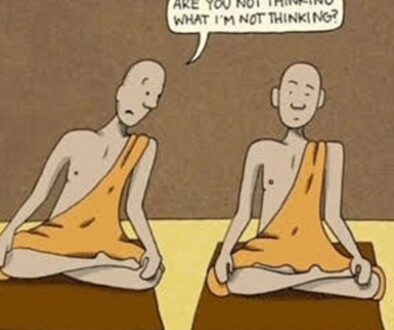ANATOMY OF A CONTRACTION by John Ames

Anatomy of a Contraction
by
John Ames
I once heard a prominent teacher make reference to “recognizing our mistakes,” which suggests free will, and I have pretty much given up on the concept of free will. Even if it exists, I have never heard a convincing proof of it. No free will, no mistakes. So, pretty sure I had him cornered, I asked the teacher for clarification.
“Could you give an example of one of those mistakes?”
“Any thought or action taken in behalf of a separate person.”
This is why we ask questions: to have the bucket kicked out from under us. The moment I asked that question, I was contracted into a separate person and was taking action in behalf of one. The teacher, on the other hand, was speaking not to John, but to the consciousness that we share and that sometimes confuses itself with John. Lord, how many times do I have to be given my comeuppance?
I have at least arrived at a point where I recognize what has happened and why, and even more importantly I accept it without much complaint. And that is no small thing. It seems that acceptance is the only tool I have. Acceptance is relaxation; anything else is contraction.
Anyone dabbling in nonduality will find that human beings are often spoken of in terms of contraction. They are described as localized densities made out of the only substance that exists, consciousness, but consciousness in such a knot that it does not recognize its unlimited true nature. Rather, it imagines itself a small unit in a vast universe, and it feels threatened, especially by other human contractions. These contractions can threaten us physically, but they are most devastating as threats to who we th ink we are: the tight bundle of traits in whose behalf we are living. Until those traits are relaxed out of, we are at their mercy at least part of the time.
ink we are: the tight bundle of traits in whose behalf we are living. Until those traits are relaxed out of, we are at their mercy at least part of the time.
So relaxation is crucial in the search for abiding truth, but how in the world can it be done, especially in a world where cause and effect is doubtful? One thing is clear: John can’t do it. As fond as I am of the fellow, I have to admit that he is the problem, not the solution. But there is good news. The awareness that is coming through John has the freedom to relax the knot it has twisted itself into, but doing so is dicey. The fear that comes with contraction is a great binder. John fears extinction, being foolish, being taken in, being vulnerable, being disrespected, and so on. And all this, as has so often been said, in the interests of an entity that is a mere transient, if he exists at all. What we want is the thing that John appears to, but that’s the very thing that thinks it’s John. What a daunting puzzle.
One of the things that makes it daunting is that contraction is a way of life. A human being is comparable to a man who has had to go to the bathroom for a very long period. He has contracted his urinary system so effectively and for such a time that when he finally gets to a urinal, he discovers an amazing problem: he can’t go. He is intellectually certain that he must go, he knows it is the best thing for him, he thinks he wants to, but still nothing. Then he starts worrying and that adds to the problem.
He stares down at the business end of his tract and wonders about his future. He may loosen his clothing, he may shake, he may massage, he may change position. None of that seems to make a difference, and then as if by divine intercession, something starts to happen, but guess what? The first sensation is not blessed relief. It is pain. Yes, relaxing is painful after a long period of contraction and the first impulse is to tighten back up, but that only prolongs the agony. For any person who has had this experience, the message is clear: Pee more often or you will pay a price.
something starts to happen, but guess what? The first sensation is not blessed relief. It is pain. Yes, relaxing is painful after a long period of contraction and the first impulse is to tighten back up, but that only prolongs the agony. For any person who has had this experience, the message is clear: Pee more often or you will pay a price.
The same tactic can be used in working with the human contraction. But if conscious awareness is the only thing with any power to affect a contracted human, how can awareness pee more often? By being knowingly aware when a contraction hits. How do you recognize it? That feeling of separation intensifies.
I once watched a student appeal to a teacher on this topic. She was crying bitter tears over her sense of separation. Why, she wondered between sobs, could she not shake the feeling of being separate? Why was she such a failure? The teacher listened patiently and then said. “You should be celebrating the fact that you recognize the problem. Do you realize how many miserable people there are on this planet who are ignorant of why they are unhappy? You are not a failure, you are a success.”
 I found this inspiring. The teacher had called this bluff in a surgical way. The questioner was imagining a world in which she was a different person, a better person, a person who had succeeded in beating the feeling of separation, but she would never be that person. The only chance she had was to admit that she wasn’t a person at all; rather, she was the one who recognized the problem, awareness itself. With that recognition, a healing is possible, but that healing is not a cure of the person but from the person. As a wise man has said, “You can’t bring the unit to the party.” However, the unit keeps trying to crash the party and that brings contraction.
I found this inspiring. The teacher had called this bluff in a surgical way. The questioner was imagining a world in which she was a different person, a better person, a person who had succeeded in beating the feeling of separation, but she would never be that person. The only chance she had was to admit that she wasn’t a person at all; rather, she was the one who recognized the problem, awareness itself. With that recognition, a healing is possible, but that healing is not a cure of the person but from the person. As a wise man has said, “You can’t bring the unit to the party.” However, the unit keeps trying to crash the party and that brings contraction.
But I promised the anatomy of a contraction, so here it is.
This tale concerns a fellow with some spiritual pretensions. Let’s call him John. John has always had reclusive tendencies. He spends quite a bit of time alone, but when he goes out, he tends to assume a formal manner with the people he meets. John knows this is a means of maintaining distance and he has been trying to relax and be less cool. He has made some encouraging strides. In fact he had recently experienced what he was willing to call a spiritual success. Earlier in the week, a friend had complained to him that the new thing at grocery store checkout was for the cashier to ask, “Any big plans for the weekend?” The friend went on to surmise that the super market staff must have meetings with a whiteboard, where a management team decided whether cashiers should stick with the usual “Did you find everything you wanted today?” or the more general “Have a nice day” or the more personally engaging “Any big plans for the weekend?” or some combination thereof.
Now, few things had been more irritating to John over the years than obvious manipulation, which would include a pro forma expression of interest in a customer’s life, especially when the insincere interest was repeated a hundred or more times during a shift. However, when he heard the customer in front of him get that very question about big plans for the weekend, just as his friend had predicted, an idea crystallized. Rather than ignoring or responding with a cool “Not really,” when John’s turn came, he beat the cashier to the punch by asking, “Any big plans for the weekend?” The spiritual success was that he had asked good-humoredly, without any disdain or sarcasm. This became evident when the young fellow behind the counter started to explain in some detail what he and his friends were planning for the weekend. John listened with interest, commented appropriately, and left the store dripping with acceptance.
Later in the day, when John was safely at home and feeling pretty darn transcendental, the phone rang. He was expecting a call from his girlfriend, so he picked up rather than letting the answering machine handle it as he so often did.
“Hello?”
“Good afternoon,” said a hearty voice, “Can I speak to John?”
A cold chill ran up John’s back.
“This is he,” John said, suddenly reluctant to pronounce his own name.
“John, I’m calling from ABC charity to tell you just how very much we appreciate your continuing support.”
This guy’s manner was all good cheer. He was calling to thank John. How thoughtful! John could feel his  hackles rising.
hackles rising.
“Uh, huh.”
“How has your day been so far?”
John was tempted to say, “It was going fine until I got a telephone call from an intrusive nonprofit bent on extracting more money from a guy who already gives regularly.” But he didn’t.
“Going pretty well. A little hot outside.”
“I hear you! Listen John, I’d like to get your opinion on some new programs we’re considering. Would you mind spending a few minutes on the phone to help us out? We’d really appreciate it!”
By now John was formulating responses involving detailed directions on where the guy could put his programs. Here was a clear case of no good deed going unpunished. Only minutes before, John had been feeling great and now this disembodied confidence man had squashed all that. John could almost hear him rattling his script.
“Well,” John began.
“Great! Here’s what we’re doing…”
“No. I am not interested in talking to you.”
“I get it. This is not a good time. What time would be better? We want to do this at your convenience.”
“I’m hanging up now. Have a nice day.”
John felt very little relief at ending the call. He was pissed off and there was no denying it. He wondered where all that spirituality had gone. He was disappointed in himself.
So what were John’s reactions all about? Were they the justified responses of a put-upon person whose privacy had been cruelly invaded, or were they a mistake? And if they were a mistake, was John a spiritual failure?
If a mistake is “any thought or action that is taken in behalf of a separate person,” then John did make a mistake. He thought he had a right to privacy, dignity, intelligence, and a knowledge of what should be happening. What’s more, he thought these personal attributes had been violated by an outside entity. That’s contraction, pure and simple, but was he a failure?
John is always a failure. In fact, “John” is just another word for failure. However, awareness was a success because instead of contracting completely into an offended John, it simply prompted John to put down the phone. It recognized what was happening and it did not buy in. Could it have been looser? If we’re talking in limited terms, sure. With no contraction at all, John would have been laughing at the obviousness of the ploy. He might have said, “I know this is your job, and you’re working hard at it, but no sale here.” And less contraction would have left less residual tightness and less dread of the next such call. And with no contraction at all, there would be no suffering, just an acceptance of things as they are. Okay, that didn’t happen, but something good did happen, something to celebrate. Awareness saw an option. The sense of  disappointment John felt was way less important than the recognition of that option. Even if he hadn’t used it positively, the recognition by itself would have deserved a gold star.
disappointment John felt was way less important than the recognition of that option. Even if he hadn’t used it positively, the recognition by itself would have deserved a gold star.
But what about that incident earlier in the day? It was along the same lines, but it had been handled with little or no contraction. Why the inconsistency? When will things be good across the board?
Worrying about that is just another contraction.




July 19, 2016 @ 11:36 am
Thanks, John. This reminds me of the expression, there are no mistakes, only lessons. The separate self can become more skillful. I see the process of becoming more expanded as aligning my will with God’s. When I identify more with God/Oneness, then the separate self feels and acts less separate. But as you point out, this isn’t the achievement of the person. It is the grace of Oneness.
July 19, 2016 @ 5:34 pm
Thanks, Kathleen. You have put it beautifully. What a subtle business this is. Love, John.
July 20, 2016 @ 5:35 pm
Very relaxing! I’ll add gratitude to that – thanks! The ending is perfect too, Awareness of “how to get it all understood – for that next time” is, well, Aware of that, and … ahhh … just Now! The way of suffering is trying to identify the mistake. As a waiter, was the mistake – to spill the coffee; not practicing presence; beating myself up afterwards; being a separate-person failure … ? I loved it when I missed a freeway exit because I was thinking about how to be in the now – and laughed instead of contracting myself more into a knot. It’s All completely Escher-like.
I had a significant moment in satsang when one spoke of being in touch with “this wonderful field of energy”. But Fred investigated and was told it was experienced as “other”. And Fred went on to describe – the experience AS this character – AS Oneness’s way of experiencing “but there must be something else”. So even it’s “high-level” epiphanies can still be nestled within separateness. And if missing a freeway exit can be a laugh … then this is OMG!
I Am, Relaxation (so i’ll stop trying so hard, lol!)
July 20, 2016 @ 7:13 pm
Hi Mike, Your sharing is always generous. Thanks so much for taking the time to put down these thoughts. I agree with you: moments of good-natured humor are quite spiritual, not to mention really enjoyable on all levels. Love, John